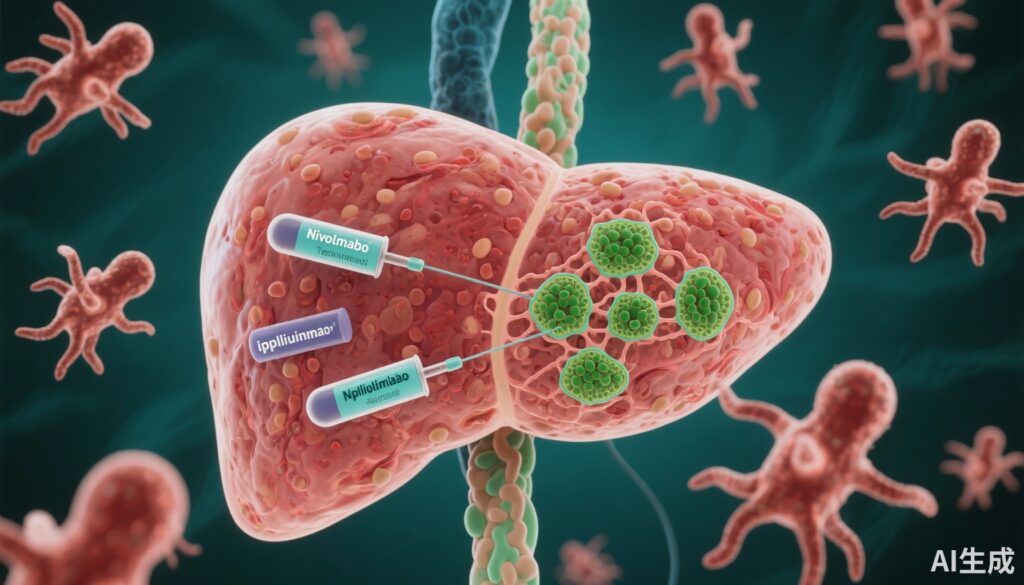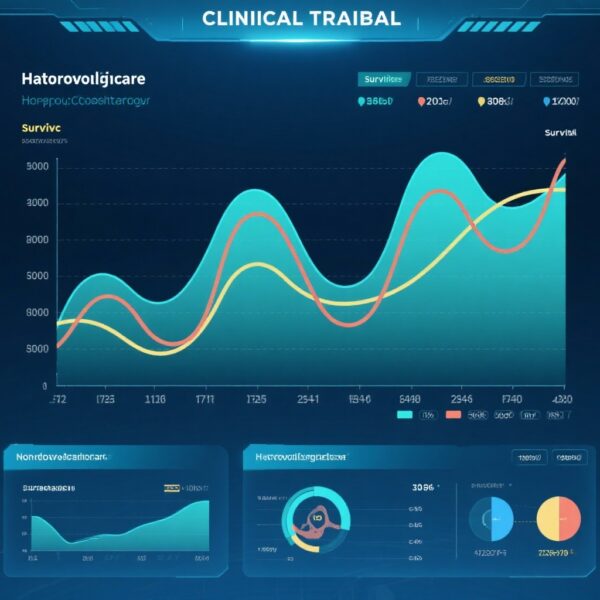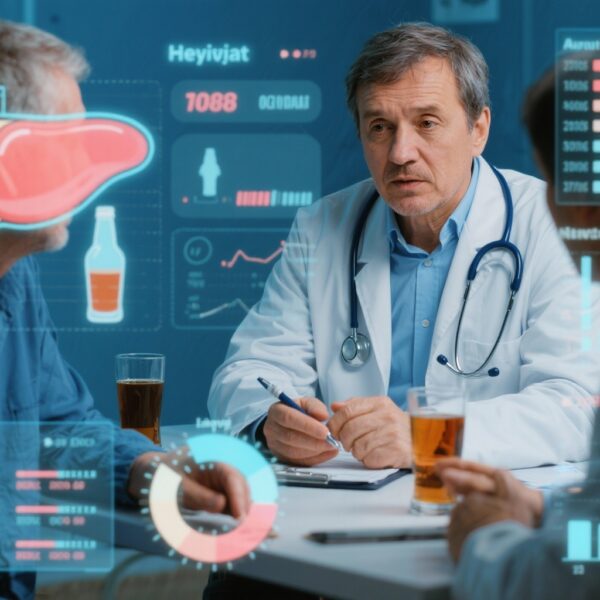Introduction
Hepatocellular carcinoma (HCC) remains a significant global health challenge, ranking among the leading causes of cancer-related mortality worldwide. Despite advances in surgical techniques and locoregional therapies, long-term survival in HCC patients, particularly those with advanced or large tumors, remains suboptimal. Immune checkpoint inhibitors (ICIs), such as anti-programmed death-1 (PD-1) and anti-cytotoxic T lymphocyte-associated protein 4 (CTLA-4) antibodies, have revolutionized systemic therapy in advanced HCC, yielding durable responses in subsets of patients. However, their role as neoadjuvant or perioperative treatments in potentially resectable HCC is under active investigation. In this context, a recent study by Lin et al. evaluated the long-term efficacy and immunological biomarkers of neoadjuvant nivolumab plus ipilimumab in patients with potentially resectable HCC, advancing our understanding of how combination immunotherapy might improve surgical outcomes and long-term survival.
Study Background
Current treatment paradigms for HCC emphasize liver resection or transplantation for early-stage disease, yet many patients present with tumors not initially amenable to surgery due to size, multifocality, or liver function. Neoadjuvant systemic therapies aim to downstage tumors to facilitate curative resection and/or eradicate micrometastatic disease. While sorafenib and other kinase inhibitors have limited neoadjuvant benefit, ICIs have demonstrated encouraging response rates in HCC. The combination of nivolumab (anti-PD-1) and ipilimumab (anti-CTLA-4) capitalizes on complementary immune mechanisms, potentially increasing antitumor efficacy. Nonetheless, data on long-term outcomes and predictive biomarkers for their neoadjuvant use remain sparse. Biomarkers such as interferon-γ signatures and tertiary lymphoid structures (TLS) may help identify responders and elucidate mechanisms of benefit.
Study Design and Methods
This prospective single-arm clinical study enrolled 43 patients diagnosed with potentially resectable HCC (37 men, 6 women; predominantly viral etiology). Patients received intravenous nivolumab at 3 mg/kg plus ipilimumab at 1 mg/kg every three weeks. Tumor response was rigorously evaluated after two and four treatment cycles, employing radiographic and pathological assessment criteria. Following neoadjuvant therapy, patients underwent curative-intent surgery or alternative standard treatments guided by clinical protocols. Serial tumor biopsies and peripheral blood samples were collected pre- and post-immunotherapy to perform genomic, transcriptomic, and immune cell profiling analyses, including spectral flow cytometry combined with advanced deep learning algorithms to characterize T cell phenotypes.
Key Findings and Clinical Outcomes
Among the treated cohort, 24 patients proceeded to surgery, with notable major pathological responses (defined as >90% tumor necrosis) observed in 8 patients. Notably, the median tumor diameter was 8.7 cm, reflecting a cohort with generally large tumors. At a median follow-up of four years, progression-free survival (PFS) was estimated at 44% (95% CI, 28-59%), and overall survival (OS) was 60% (95% CI, 42-74%), suggesting promising long-term benefits for this neoadjuvant approach.
Safety was manageable, consistent with known immune-related adverse events associated with checkpoint inhibition; no unexpected toxicities were reported. Importantly, neoadjuvant therapy did not preclude surgery, supporting its feasibility in potentially resectable patients.
Biomarker analyses revealed that elevated interferon-γ and TLS gene signatures within resected tumors were significantly associated with objective response, highlighting the role of adaptive antitumor immunity. Mechanistically, murine liver cancer models corroborated the importance of B cells and TLS formation, as depletion of B cells abrogated antitumor efficacy of anti-PD-1 plus anti-CTLA-4 therapy. Peripheral blood analyses demonstrated that T cell activation and exhaustion phenotypes at baseline and after treatment correlated with clinical outcomes, underscoring the potential of blood-based immunoprofiling to predict response and survival.
These findings collectively suggest that immunotherapy-induced TLS development may potentiate antitumor immune responses, representing both a biomarker and mechanistic correlate of clinical benefit.
Expert Commentary
This study provides pioneering evidence supporting the use of combination ICI therapy as neoadjuvant treatment in large or borderline resectable HCC. The substantial pathological response rate and encouraging 4-year survival data mark a paradigm shift, potentially expanding therapeutic options for patients with otherwise high-risk tumors.
While the single-arm design and modest sample size temper definitive conclusions, the integration of molecular and immunological biomarkers enhances mechanistic understanding and guides future precision approaches. The central role of TLS, emerging as a hallmark of effective antitumor immunity, echoes findings in other solid tumors and underscores the importance of B cell-mediated immune orchestration. Peripheral blood T cell evaluation via cutting-edge flow cytometry and machine learning presents promising avenues for non-invasive response monitoring and patient stratification.
Nonetheless, randomized controlled trials comparing neoadjuvant immunotherapy plus surgery versus surgery alone or other systemic regimens are needed to validate these encouraging findings. Consideration of liver function, viral status, and HCC heterogeneity will be critical to optimally tailor immunotherapy approaches.
Conclusion
The combination of nivolumab and ipilimumab as neoadjuvant therapy in potentially resectable HCC demonstrates a feasible and promising strategy, achieving meaningful pathological response and favorable long-term survival outcomes. Biomarker analyses identify interferon-γ signaling and tertiary lymphoid structures as key correlates of response, offering insights into the immune biology underlying clinical benefit and guiding personalized therapy. This work lays an important foundation for future clinical trials integrating immunotherapy into curative-intent liver cancer management, aiming to improve patient prognosis.
Funding and Clinical Trial Registration
This study was registered under ClinicalTrials.gov identifier NCT03510871. Details on funding sources were not specified in the primary publication.
References
Lin YJ, Ou DL, Su YY, Hsu CL, Hsiao CF, Ko BS, Chen SC, Wang HW, Wang JH, Wu YM, Jeng YM, Lee WC, Chou SC, Chen TW, Chiu CF, Shiuan Lin Jr, Hsieh CH, Lee CC, Shen YS, Cheng AL, Chen LT, Hsu C. Nivolumab plus ipilimumab for potentially resectable hepatocellular carcinoma: long-term efficacy and biomarker exploration. J Hepatol. 2025 Sep 17:S0168-8278(25)02471-7. doi: 10.1016/j.jhep.2025.08.035. Epub ahead of print. PMID: 40972843.



